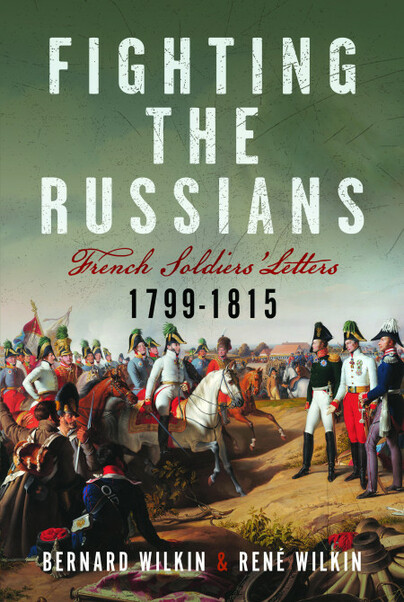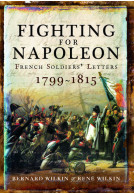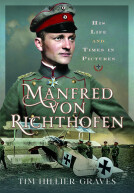Fighting the Russians (Hardback)
French Soldiers’ Letters, 1799-1815
Imprint: Pen & Sword Military
Pages: 216
Illustrations: 20 mono illustrations
ISBN: 9781399059626
Published: 11th November 2024
(click here for international delivery rates)
Need a currency converter? Check XE.com for live rates
| Other formats available | Price |
|---|---|
| Fighting the Russians ePub (12.6 MB) Add to Basket | £14.99 |
Before the French Revolution, the Russian Empire played a minor role in the history of Western Europe, yet its involvement in the wars of the Republic and against Napoleon would change its influence on the fate of the continent forever.
Fighting the Russians examines the crucial role played by the men of the Czar's Empire through hundreds of original letters, notebooks and accounts written by French soldiers at the time of the events or shortly after the fall of Napoleon. These rare unpublished sources, or those never before translated into English, recount key moments such as the battles of Zurich, Austerlitz, Eylau, Borodino and Leipzig, the burning of Moscow, the passage of the Berezina and the capture of Paris by the Cossacks. The terrible retreat from Russia and the torture inflicted on French soldiers by irregulars are also examined, as well as the times Napoleon was almost captured by Russian horsemen.
Together, these writings plunge the reader into a world of unprecedented violence, but they also reveal the French fascination with the Russians, who were perceived as strange individuals from faraway lands whose courage bordered on madness.
The book is divided into seven chapters: Wars of the French Revolution; The road to Austerlitz; War and Peace; Invading Russia; Moscow; Retreat! and Decline and fall of the French Empire. Readers are given a narrative of the various campaigns, told through extracts from memoirs of French officers and men. The majority – nearly a hundred pages – of the book is devoted to the invasion of Russia in 1812 and its aftermath.
Miniature Wargames, Arthur Harman
In their short Conclusion, the editors suggest that ‘the advent of peace [in 1815] transformed Russia from a remote power, almost alien to Europe, into a crucial player in the continent’s politics…the Napoleonic Wars definitely marked Russia’s arrival on the European political scene.’
Eight pages of monochrome plates, bound in the centre of the book, include reproductions of contemporary portraits and battle-scenes, the majority of which will be familiar to readers. Some, such as Lejeune’s pictures of the eve of Austerlitz and the battle of Borodino, cannot be done justice in such half-page reproductions.
The only map in the entire book is a half-page reproduction of that of the Battle of Friedland from the Encyclopaedia Britannica of 1911.
References are given in footnotes to the text. A three-page bibliography and an index conclude the book.
Readers who wargame any of the campaigns fought by the French against the Russians will appreciate the editors making these primary sources available in English.
A wonderful book that analyzes and brings back to life from Austerlitz to Borodino La Moscowa, passing through the formidable charge of Eylau, the epic of battles but also of alliances between France and Russia. Extremely well documented, this book helped me understand why Russian culture is still today so deeply rooted in the French collective unconscious and why Russians continue to toast "Prince Murat".
Prince Joachim Murat
Bernard and Rene Wilkin bring fresh insights into the trauma that the French Army experienced when facing the Russian army. Using a wealth of published letters and diaries – many never translated to English before- as well as unpublished archive documents, the march on Moscow, Borodino and the route are recalled in compelling detail. Of all Napoleon’s enemies, the Russians were the most tenacious: since the Flanders campaign, the Russians had challenged France for control and dominance of Europe. For Russia, the war with Napoleon was an “annoyance” that distracted from the war in the east with Turkey. Yet war when it came to the borders of Mother Russia, showed the Russian soldiers were every bit the equal of the French. In the climatic campaigns of 1813 and 1814, French eye-witnesses relate the savage brutality of the last battles of the Empire and how Napoleon was nearly captured by Cossacks. Bernard and Rene are to be congratulated for making these sources available to the reader, in a narrative drive by the men and civilians who witnessed the fighting first hand. The authors show, how Russia once involved in European affairs, became transformed into a European super power, resulting in a trauma cemented into French and Russian national psyche: 1812 which marked the high and low points of the war. Highly recommended.
Paul L Dawson, fellow author
'A fascinating and often intimate glimpse into the Revolutionary and Napoleonic wars against Russia from the perspective of French officers and soldiers: highly recommended.'
Andrew Field
About Bernard Wilkin
Bernard Wilkin is a Belgian historian who works as a lecturer at the University of Exeter, where he specialises in the history of the French army and the French people at war, from Napoleon to the end of the Third Republic. He has published on various subjects such as propaganda in France during the two world wars, morale in the French army and on the home front during the Great War. René Wilkin, the father of Bernard, studied and taught history in the city of Liège where he was born. He is now retired but continues to work on Napoleonic history from a French perspective.


















